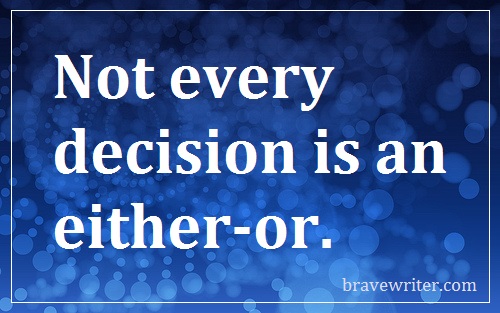The Old El Paso principle of homeschooling
The following was written by Brave Writer instructor, Jean Hall:
This morning, my son was busy redesigning a Lego robot with a teammate for a 4-H contest. I melted into the background, unneeded but technically still the “adult supervision.” I heard them each suggesting a different idea for the same task, and then after a pause, one voice said, “Oooh! even better…let’s use both ideas!” I got muddled in the ensuing explanation since I don’t know the context of the design, but the principle was clear. They found a way to use both ideas rather than choose one, and together it made the robot better.
My mind flashed back to the Old El Paso commercial. You know the one where the family argues about whether to eat soft tacos or hard tacos, and the little girl shrugs, “Why not both?” And everyone celebrates.
How often this simple concept improves my homeschooling. Should I sign this kid up for art classes or for the robotics team? Should we use textbooks or unit studies? Should I set a schedule or should I allow for flexibility and impromptu activities suggested by my child? Should I use CLEP tests or dual enrollment for my high schooler?
Why not both? Homeschooling doesn’t have to be the same everyday or every year. It might be that my child can cross stereotypes and be talented in both art and science. It might be that a science textbook helps me through one season while hands-on unit studies, experiments and child-led exploration helps through the next. It might be that a regular schedule helps me be productive, but taking an afternoon off when my daughter says, “Can we have a picnic?” allows for needed laughter and rest. It might be that CLEP-ing out of one subject and dual enrolling for another gets my high school student what he needs.
Not every decision is an either-or.
I remember a conversation years ago (and my mind has fuzzed a few details but remembered the gist) where I explained to a mom that no matter what my elementary student wrote, I could find something to affirm in it, and that I didn’t make him revise everything…but sometimes let a writing stay as it was, and then revised the next thing he wrote. She didn’t think that would work for her, arguing the she had “high expectations.”
Why not both? Is it not possible to celebrate what my child has done, be supportive and encouraging in the first stages, and yet still have high expectations and work with him to eventually produce high quality results in the end?
Something to ponder as we wrestle with (and sometimes feel overwhelmed by) so many decisions in our homeschooling. We don’t always have to choose. Sometimes…we can have both.
And now I want to eat a taco!
Blessings,
Jean
Image’s background by webtreats


















